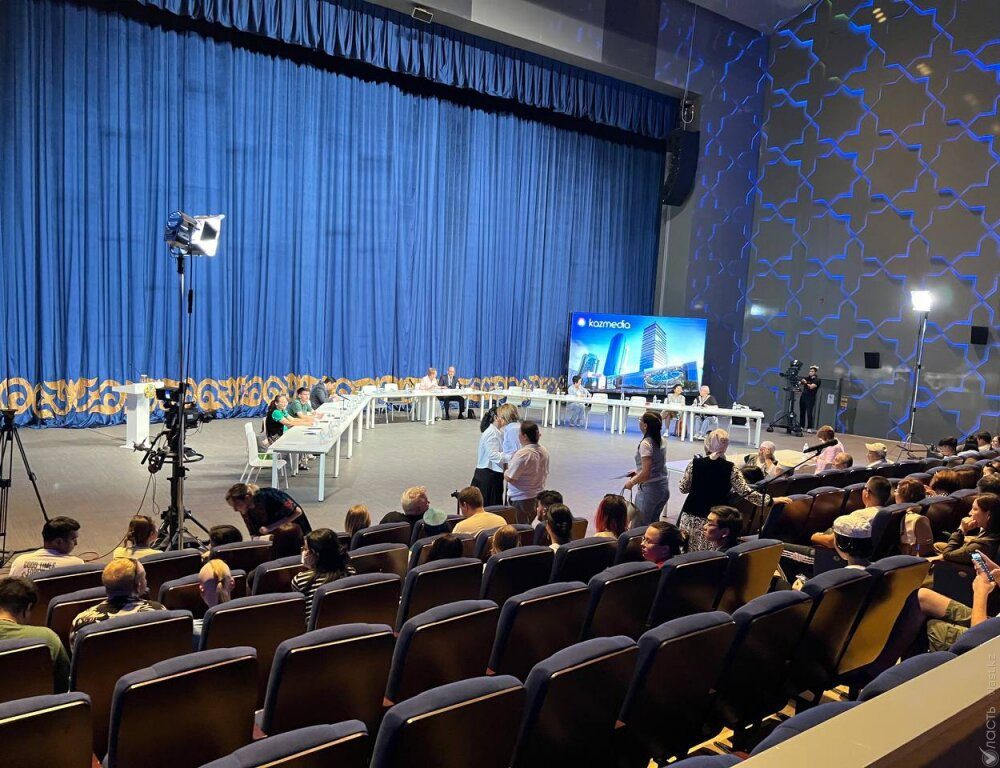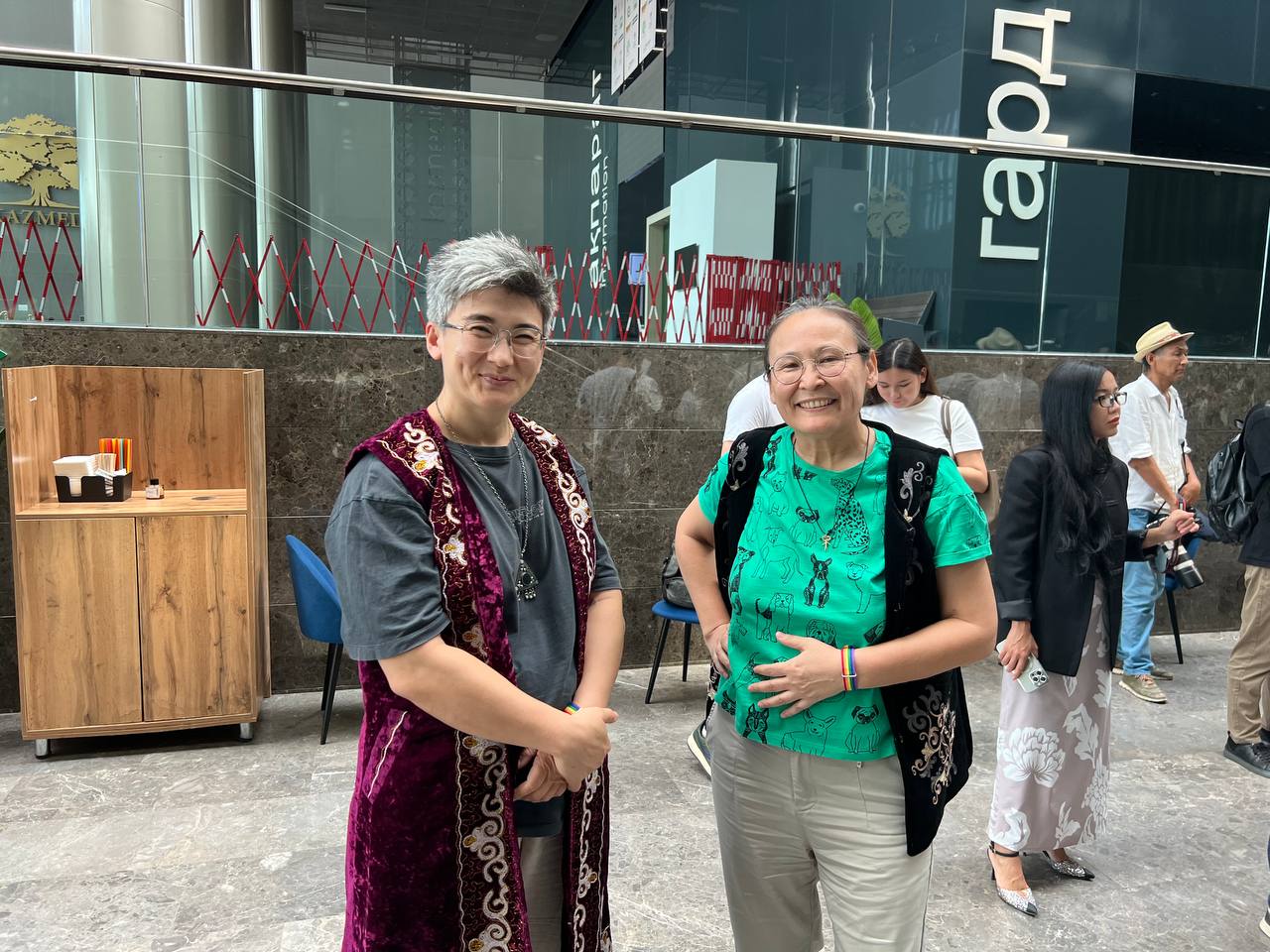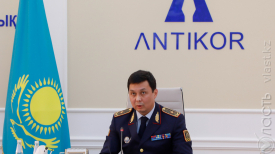- ВКонтакте
- РћРТвЂВВВВВВВВнокласснРСвЂВВВВВВВВРєРСвЂВВВВВВВВ
Bagila Baltabayeva, the chair of the Union of Parents, said she traveled across Kazakhstan to collect signatures needed to push her petition to the national agenda. She managed to convince more than 50,000 people to endorse her attempt to ban so-called “LGBT propaganda,” which, she argues, consists of a range of “Western values” that are alien to Kazakhstan’s society.
Once the 50,000 threshold was reached, the government had to conduct, by law, a public discussion to see if it should consider making legislative amendments and adopt the motion.
The last public discussion took place in Astana at the government-run Kazmedia Center, where several dozen among proponents and critics gathered on August 1. Several representatives of the government also attended to provide their official opinion on the petition.
At the public discussion, a representative of the ministry of internal affairs said that the main reasons for the increase in crimes is the ongoing online dissemination of information “about freedom of sexual relations.” He gave no further explanation.
A representative of the ministry of health also chimed in, pointing to aggressive advertising, especially for energy drinks and vapes, something that angered a few of the activists that had taken part in the discussion, who could not see the connection between the sale of specific items to minors and the protection of so-called “traditional values”.
Traditionally Conservative
The Union of Parents has distinguished itself for its conservative, and sometimes conspiratory, views over the past few years. The group opposed the adoption of stricter laws to tackle domestic violence, with a misleading campaign that argued that children would be taken away from families. During the COVID-19 pandemic, the Union also actively opposed the government’s vaccination campaign, thereby putting people's lives at risk.
During a meeting on the “LGBT propaganda” proposal on July 10, Baltabayeva directly pointed to what she called “Western values”, deeming them a threat to the nation.
“A little child today can become the leader of the country tomorrow. And today these 8-9 year old girls go to rallies and say ‘my vagina is my business’, ‘down with the patriarchy, let's have a revolution’. What kind of people will govern our country? I think this is a huge threat at the national level,” Baltabayeva said.
At the same meeting, disregarding both global scientific and legal precedents, Almaz Zheksekin, associate professor of Constitutional and International Law at Karaganda State University, said that if children “choose to become LGBT, [...] this will harm our national unity and integrity.”
Bella Filimonova, head of the public foundation Blago-Daryu, said she has nothing against people’s private lives: “We are simply against holding rallies, against going into schools with sex education and the like.”
In response to these interventions, Khalida Azhigulova, a children’s rights lawyer, debunked the myths that were voiced by the proponents of the petition.
“Neither Baltabayeva nor Filimonova provided any concrete facts about how this ‘LGBT propaganda,’ turned at least one citizen of the Republic of Kazakhstan into a representative of the LGBT community. All we heard from them were populist slogans and subjective opinions without any concrete facts, concrete statistics or explanations,” Azhigulova noted.
“The WHO states that sexual orientation is an innate trait and cannot be acquired. Therefore, ‘LGBT propaganda’ cannot in any way influence the change of sexual orientation in children,” Azhigulova concluded.
At the August 1 public discussion, human rights advocate Yevgeniy Zhovtis repeated that sexual orientation cannot be promoted and that homosexuality is not a pathology.
Zhovtis reminded the audience of Kazakhstan’s Constitution, citing article 14.2:
“No one shall be discriminated against on the grounds of origin, social, official or property status, sex, race, nationality, language, attitude to religion, convictions, place of residence or any other circumstance.”
Discrimination against LGBT+ people falls specifically under the phrase “any other circumstance,” according to Zhovtis.
A Russian Law
Earlier in July, Human Rights Watch, a US-based advocacy group, said the petition is “discriminatory and stigmatizing.”
“It refers to Russia’s laws banning ‘nontraditional sexual relationships propaganda,’ which have been universally condemned by human rights bodies,” the HRW statement read.
The reference to Russia’s laws was echoed during the public discussion on July 10, after Gulzada Serzhan, an activist at the LGBT+ rights group Feminita, noted that Baltabayeva referenced the adoption of similar laws in Russia as a good precedent.
“This initiative to ban ‘LGBT propaganda’ in order to protect children’s rights arose under Russian influence. In Russia, this law was adopted in 2013, 11 years ago,” Serzhan said.
Zhanar Sekerbayeva, also from Feminita, noted that the law had negative effects on the LGBT+ community in Russia.
“They have constant pressure on LGBT+ people there. No one from the LGBT+ community can say anything there,” Sekerbayeva added.
The Next Steps
A working group formed under the ministry of information and culture partially supported the petition. It tasked several ministries with setting up scientific teams to research several topics, including the “influence of the LGBT movement on youth.” What exactly will be researched remains unclear, given that “LGBT movements” do not exist anywhere in the world.
Activists said they plan to continue bringing arguments against the very concept of “LGBT propaganda,” something that does not exist in reality.
The government’s support for the petition makes it almost inevitable that some form of restriction in this area will eventually be adopted, given the rubber-stamp nature of Kazakhstan's legislative process.
Поддержите журналистику, которой доверяют.










